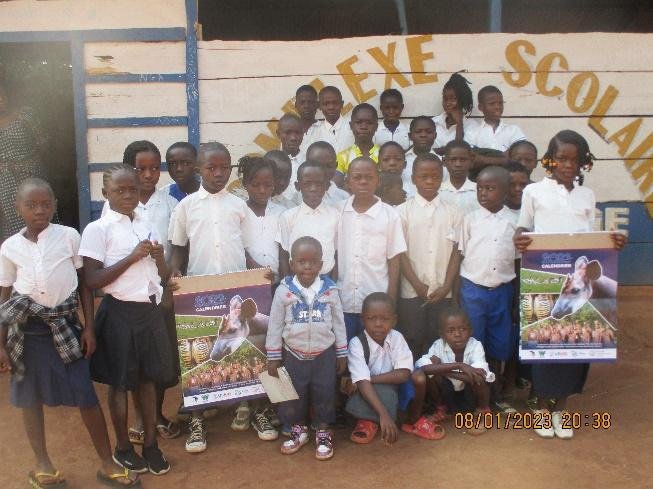Education reaches thousands around the Okapi Wildlife Reserve
Primary schoolchildren with 2023 conservation calendars.
Our education programming started 2023 with renewing our contracts with radio stations that promote and disseminate our educational radio broadcasts. Broadcasts are transmitted in French, Swahili, and Lingala when possible, and cover a series of topics. New recordings were added this quarter highlighting the OCP agroforestry program and interviews with Rosmarie Ruf and ICCN ecoguard Rosette about ICCN’s mission to protect the invaluable biodiversity of the Okapi Wildlife Reserve.
Interviewing Rosie for radio broadcasts.
Over 3,000 calendars with conservation messaging and imagery of the Reserve were dispersed regionally to local and indigenous communities, businesses, government institutions, and schools, accompanied by conversational presentations on the importance and conservation of the Reserve. The OCP education program also printed and distributed 720 public health teacher guides and 220 educational booklets on the OWR to 120 primary schools in Epulu, Kilimamweza, Bafwakoa, Mambasa, Mungbere, Lolwa, Wamba, Betongwe, Selesele, Isiro, Watsa, Niania, Bayenga, Bafwasende, Bunia, Beni, Butembo and Kinshasa.
Berce Nsafuansa, our Program Manager, presented to over 2,300 university students in Bunia. Conferences were held with Shalom University, the University of Bunia, the Anglican University of Congo, and the Teachers Training College of Bunia to raise awareness of the Okapi Wildlife Reserve and current conservation efforts by OCP and our partners, ICCN and WCS. We are excited to connect with the rising generation of scientists and conservation leaders through these conferences.
Berce speaking to university students in Bunia.
Finally, in our enduring efforts to improve our capacity, the OCP education team took part in two primary training sessions. The first, organized by WCS and the Sustainable Wildlife Management (SWM) program, focused on monitoring of animal protein selling points. These encompass markets, small isolated stalls, butchers, fish stores, and more. The training aimed to strengthen methodologies for monitoring the diversity, availability, and prices of different animal proteins as well as document the presence of protected wildlife species in the trade.
The second training under the USAID Tujenge Project concentrated on conflict management, working with our participants to develop their knowledge and essential skills in peace, conflict, and violence understanding. The training delved into conflict typology, contextual analysis, actor mapping, negotiation techniques, mediation strategies, and the efficacy of dialogue as a potent tool for community mediation. This investment in education equips us to navigate challenges more adeptly while fostering harmony within the community and the environment we cherish. We thank WCS for their facilitation of the training.



